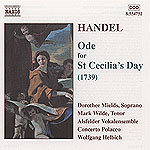This is an okay performance of Handel’s Ode for St. Cecilia’s Day–though the patron saint of music deserves better. Much of the problem rests with conductor Wolfgang Helbich’s often-sluggish tempos and uninspired articulation. His lack of swing in the opening bars of the Overture and the disinterested treatments of the Airs in the fifth and 10th movements and the March in the seventh are among the more prominent disappointments. The soloists are generally fine, though they rarely let loose, regardless of the many opportunities Handel presents them. For instance, even the rousing sixth-movement Air and chorus “The trumpets loud clangour” (arguably these performers’ finest moments) could use a greater sense of urgency. Tenor Mark Wilde sounds respectable enough–though how about a little more punch in the “Hark!” and a little more chutzpah in “The double, double, double beat”?
Colleague Dan Davis highly praised Trevor Pinnock’s recently reissued 1985 recording on Archiv Blue with Felicity Lott and Anthony Rolfe Johnson (type Q7125 in review search), and all listeners who want a world-class performance of this glorious Ode need look no further than that one.
































